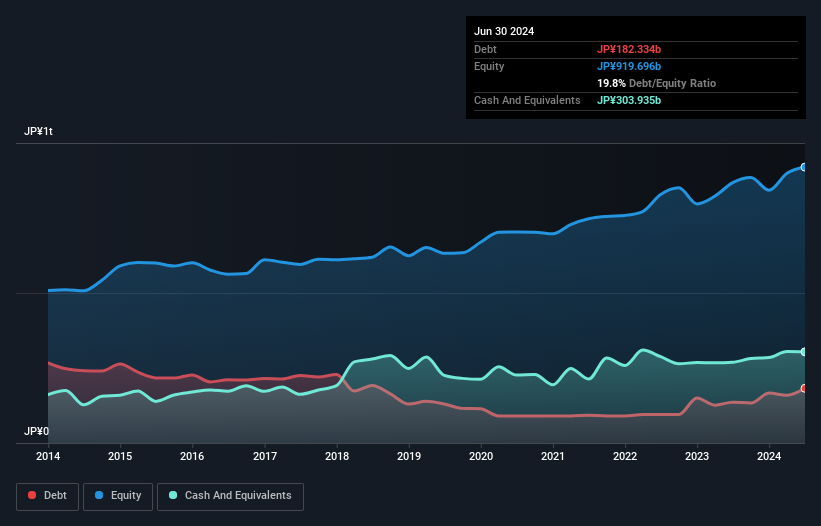
Howard Marks put it nicely when he said that, rather than worrying about share price volatility, 'The possibility of permanent loss is the risk I worry about... and every practical investor I know worries about.' It's only natural to consider a company's balance sheet when you examine how risky it is, since debt is often involved when a business collapses. We can see that Eisai Co., Ltd. (TSE:4523) does use debt in its business. But should shareholders be worried about its use of debt?
When Is Debt A Problem?
Debt is a tool to help businesses grow, but if a business is incapable of paying off its lenders, then it exists at their mercy. Part and parcel of capitalism is the process of 'creative destruction' where failed businesses are mercilessly liquidated by their bankers. However, a more frequent (but still costly) occurrence is where a company must issue shares at bargain-basement prices, permanently diluting shareholders, just to shore up its balance sheet. Of course, debt can be an important tool in businesses, particularly capital heavy businesses. The first thing to do when considering how much debt a business uses is to look at its cash and debt together.
Check out our latest analysis for Eisai
How Much Debt Does Eisai Carry?
You can click the graphic below for the historical numbers, but it shows that as of June 2024 Eisai had JP¥182.3b of debt, an increase on JP¥136.2b, over one year. However, it does have JP¥303.9b in cash offsetting this, leading to net cash of JP¥121.6b.

How Healthy Is Eisai's Balance Sheet?
We can see from the most recent balance sheet that Eisai had liabilities of JP¥311.0b falling due within a year, and liabilities of JP¥189.5b due beyond that. On the other hand, it had cash of JP¥303.9b and JP¥205.4b worth of receivables due within a year. So these liquid assets roughly match the total liabilities.
This state of affairs indicates that Eisai's balance sheet looks quite solid, as its total liabilities are just about equal to its liquid assets. So while it's hard to imagine that the JP¥1.53t company is struggling for cash, we still think it's worth monitoring its balance sheet. Simply put, the fact that Eisai has more cash than debt is arguably a good indication that it can manage its debt safely.
The modesty of its debt load may become crucial for Eisai if management cannot prevent a repeat of the 44% cut to EBIT over the last year. When a company sees its earnings tank, it can sometimes find its relationships with its lenders turn sour. There's no doubt that we learn most about debt from the balance sheet. But ultimately the future profitability of the business will decide if Eisai can strengthen its balance sheet over time. So if you want to see what the professionals think, you might find this free report on analyst profit forecasts to be interesting.
Finally, a company can only pay off debt with cold hard cash, not accounting profits. While Eisai has net cash on its balance sheet, it's still worth taking a look at its ability to convert earnings before interest and tax (EBIT) to free cash flow, to help us understand how quickly it is building (or eroding) that cash balance. Over the last two years, Eisai recorded negative free cash flow, in total. Debt is far more risky for companies with unreliable free cash flow, so shareholders should be hoping that the past expenditure will produce free cash flow in the future.
Summing Up
While we empathize with investors who find debt concerning, you should keep in mind that Eisai has net cash of JP¥121.6b, as well as more liquid assets than liabilities. So while Eisai does not have a great balance sheet, it's certainly not too bad. The balance sheet is clearly the area to focus on when you are analysing debt. However, not all investment risk resides within the balance sheet - far from it. To that end, you should learn about the 3 warning signs we've spotted with Eisai (including 1 which doesn't sit too well with us) .
If, after all that, you're more interested in a fast growing company with a rock-solid balance sheet, then check out our list of net cash growth stocks without delay.
Valuation is complex, but we're here to simplify it.
Discover if Eisai might be undervalued or overvalued with our detailed analysis, featuring fair value estimates, potential risks, dividends, insider trades, and its financial condition.
Access Free AnalysisHave feedback on this article? Concerned about the content? Get in touch with us directly. Alternatively, email editorial-team (at) simplywallst.com.
This article by Simply Wall St is general in nature. We provide commentary based on historical data and analyst forecasts only using an unbiased methodology and our articles are not intended to be financial advice. It does not constitute a recommendation to buy or sell any stock, and does not take account of your objectives, or your financial situation. We aim to bring you long-term focused analysis driven by fundamental data. Note that our analysis may not factor in the latest price-sensitive company announcements or qualitative material. Simply Wall St has no position in any stocks mentioned.
About TSE:4523
Eisai
Engages in the research and development, manufacture, sale, and import and export of pharmaceuticals in Japan.
Proven track record with adequate balance sheet and pays a dividend.
Similar Companies
Market Insights
Community Narratives



